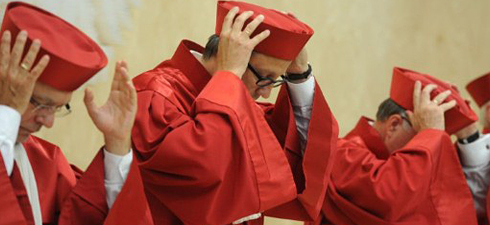The euro has been judged – but not yet saved. The ruling of the Constitutional Court is a ruling on a crisis; it’s good for getting through the euro crisis. The ruling is not against Europe, nor does it threaten Europe – probably because the situation is already dangerous enough. The court wants to help to overcome the crisis, and to this end it exploits what can be done under Constitutional Law to the last comma.
To rescue the euro was not the task of the Federal Constitutional Court. Nor was the Court tasked with judging whether the fiscal measures are appropriate for the rescue. The task of the judge was solely to decide whether the German contribution of many billions of euros towards helping Greece and the euro was constitutional.
It is, says the court – which follows up with a cascade of "ifs". Such aid is constitutional if the Budget Committee approves each and every payment – i.e., if there are no automatic payouts; if Parliament retains mastery over the German payment procedure – i.e, if Parliament preserves the ability to monitor; that is, not just to nod yes, but to continue to declare a binding “No”. With its flow of provisos, the Supreme Court has, for now, prevented the castration of the Bundestag. Only for that reason and only then – after all those satisfied “ifs” – are the billions of aid deemed constitutional.
Basic Law must be fundamentally amended
Who wants still more of the European Union must write more of the European Union into the Constitution. The decision on the crisis passed down in Karlsruhe is a policy decision pertinent to the crisis, but not a landmark decision for the European Union. It can guide Germany’s EU policy through the crisis, but not beyond it. It is no basis for further European integration. The force of the Basic Law as it may apply to how a federal Europe is to emerge from an association of states is now dwindling. This is the deeper content of this ruling on the euro and on assistance to Greece.
It is, and all the arts of interpretation cannot obscure it, as follows: The possibilities for Europe in the old Constitution have been exhausted. If more Europe is needed, if a European government is established – whether it is called "economic government" or something else – then it is no longer enough to bring the German parliament into it even further. Such a move will need a new constitutional basis; the Basic Law must be fundamentally amended, and the people must vote.
For that reason alone it is still too early for that, because in the face of activism at the European level it remains unclear what actually should be voted on. Who still wants more of the European Union must write even more of the European Union into the Constitution. This must be Germany’s sovereign decision, and it must come as soon as the crisis passes.
Translated from the German by Anton Baer
Was this article useful? If so we are delighted!
It is freely available because we believe that the right to free and independent information is essential for democracy. But this right is not guaranteed forever, and independence comes at a cost. We need your support in order to continue publishing independent, multilingual news for all Europeans.
Discover our subscription offers and their exclusive benefits and become a member of our community now!












